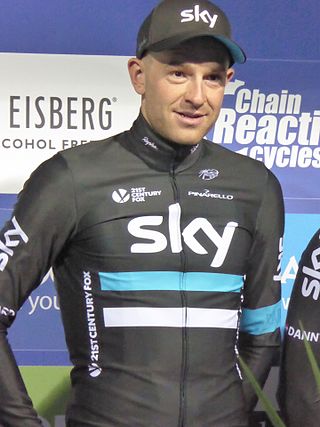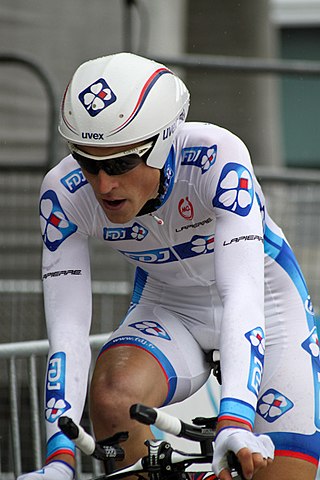
Greg Van Avermaet is a retired Belgian professional cyclist. Considered one of the most versatile riders of modern cycling, Van Avermaet was a specialist of the classic cycle races, but has also won stages and the general classification in stage races, particularly when run on a hilly terrain, such as the 2016 Tirreno–Adriatico, and the 2018 Tour de Yorkshire. His strong sprint finish enabled him to win sprints of small lead groups, but he has also won races after solo breakaways.

Ian Dexter Stannard is a British former professional track and road racing cyclist, who rode professionally in 2006 and from 2008 to 2020 for the Van Vliet–EBH Advocaten, Landbouwkrediet–Tönissteiner, ISD and Ineos Grenadiers teams, before retiring after being diagnosed with rheumatoid arthritis. He now works as a directeur sportif for UCI WorldTeam Ineos Grenadiers, having previously held the same role for UCI Continental team Trinity Racing.

The Men's Individual Road Race of the 2010 UCI Road World Championships cycling event took place on 3 October in Melbourne and concluded in Geelong, Australia. Thor Hushovd claimed the World Championship in a sprint finish, to become the first Norwegian to win the World Championship road race.
The 2010 season for Team Milram, its last, began in January with the Tour Down Under and ended in October at the Giro di Lombardia. As a UCI ProTour team, they were automatically invited and obliged to attend every event in the ProTour. The team's ridership was largely unchanged from the 2009 season.

The 2010 Tour de France begins on 3 July in Rotterdam in the Netherlands with a prologue time trial, and stage 10 occurs on 14 July, with a medium mountain stage in Gap.
The 2011 season for the BMC Racing Team began in January with the Tour Down Under and ended in October at the Giro di Lombardia. As a UCI ProTeam, they were automatically invited and obligated to send a squad to every event in the UCI World Tour.

The 2011 season for the FDJ cycling team began in January at La Tropicale Amissa Bongo and ended in October at the Chrono des Nations. The season was their first as a UCI Professional Continental team, having been denied UCI ProTeam status for 2011 in the preceding offseason, due to a paperwork error. Thus, the team had to be selected by organizers of UCI World Tour events, including each of the season's Grand Tours, if they were to compete. Only the Tour de France extended a wildcard invitation to FDJ.
The 2011 season for Quick-Step began in January at the Tour Down Under and ended in October at the Giro di Lombardia. As a UCI ProTeam, they were automatically invited and obligated to send a squad to every event in the UCI World Tour.
The 2011 season for the Team Sky cycling team began in January at the Bay Classic Series and ended in October at the Noosa Grand Prix. As a UCI ProTeam, they were automatically invited and obligated to send a squad to every event in the UCI World Tour. Improving upon 20 victories in the 2010 season, Team Sky managed 28 victories during the season, including four Grand Tour stage wins, two each at the Tour de France and the Vuelta a España. Also at the Vuelta, the team achieved their best Grand Tour showing to date with Chris Froome and Bradley Wiggins finishing the race in second and third places – behind Geox–TMC's Juan José Cobo – having both held the red jersey for the general classification lead at some stage of the race. Outside of the Grand Tours, the team achieved stage victories at four other World Tour events and the overall victory at two, with Wiggins winning the pre-Tour warmup event, the Critérium du Dauphiné and Edvald Boasson Hagen claimed victory at the Eneco Tour held in Belgium and the Netherlands. The team were not as successful in single-day races, with three wins taken by Christopher Sutton, Boasson Hagen and Mathew Hayman. With the performances of Froome, Wiggins and Boasson Hagen, Team Sky made a substantial leap up the World Tour rankings; having finished fifteenth in the 2010 UCI World Ranking, Team Sky finished as runners-up in the 2011 rankings, just 40 points behind overall winners Omega Pharma–Lotto.
These are the profiles for the individual stages in the 2011 Tour de France, with Stage 1 on 2 July, and Stage 11 on 13 July. In February 2012 following doping allegations a decision by the Court of Arbitration for Sport stripped of all results of Alberto Contador obtained in and later than the 2010 Tour de France, which led him to being stripped of that title, as well as his results in the 2011 Tour de France. His results have thus been removed here, with cyclists behind him moving up one spot.

The 2015 Tirreno–Adriatico was the 50th edition of the Tirreno–Adriatico stage race. It took place from 11 to 17 March and was the third race of the 2015 UCI World Tour. The race was one of the most important races in the early part of the cycling season and was used by riders preparing both for the Grand Tours and for the classics season.

The 2015 Milan–San Remo was a one-day cycling classic that took place in Italy on 22 March. The race was the 106th edition of the Milan–San Remo. It was the fourth of the 28 races on the Union Cycliste Internationale's (UCI) 2015 World Tour and the first of them to be a one-day race. It was also the first of the 2015 cycling monuments, the five most important one-day races of the year. The defending champion was Alexander Kristoff, who won the previous year's race in a sprint.

The 2015 Amstel Gold Race was the 50th edition of the Amstel Gold Race one-day race. It took place on 19 April and was the eleventh race of the 2015 UCI World Tour. The Amstel Gold Race formed part of the Ardennes classics season, although it took place in the Limburg region of the Netherlands rather than in the Belgian Ardennes. It took place in the week before La Flèche Wallonne and Liège–Bastogne–Liège, the other principal Ardennes classics. The defending champion in the 2015 edition of the race was Philippe Gilbert, who had won the race three times and had also won the 2012 world championships on a very similar course.
The 2015 Clásica de San Sebastián was a one-day cycling classic that took place in the Basque Country in Spain on 1 August 2015. It was the 35th edition of the Clásica de San Sebastián and was the nineteenth race of the 2015 UCI World Tour. The defending champion was Alejandro Valverde, who won a solo victory in the 2014 race.

The 2015 Omloop Het Nieuwsblad was the 70th edition of the Omloop Het Nieuwsblad road cycling race, traditionally seen as the beginning of the cobbled classics season along with the Kuurne–Brussels–Kuurne the following day. It was rated as a 1.HC race as part of the 2015 UCI Europe Tour. The race took place on 28 February 2015, starting and finishing in the city of Ghent.
The 2015 Eneco Tour was a road cycling stage race that took place in the Netherlands and Belgium between 10 and 16 August 2015. It was the 11th edition of the Eneco Tour stage race and was the twenty-first race of the 2015 UCI World Tour.

The 2016 Tour of Flanders was a one-day classic cycling race that took place in Belgium on Sunday 3 April 2016. It was the 100th edition of the Tour of Flanders; it was the eighth event of the UCI World Tour and the third of the cobbled one-day classics. It was the second Monument race of the 2016 cycling season.

The 2016 E3 Harelbeke was a one-day cycling classic that took place on Friday 25 March 2016. It was the 59th edition of the E3 Harelbeke; it was the second one-day race of the 2016 UCI World Tour and the first of the cobbled classics.
The 2016 Gent–Wevelgem, was a one-day cycling classic that took place on 27 March 2016. It was the 78th edition of the Gent–Wevelgem race and the seventh event of the 2016 UCI World Tour. The race followed a 243-kilometre (151 mi) course that started in Deinze and ended in Wevelgem in Belgium, with a portion of the race spent in northern France. The race included ten climbs, several of them cobbled, which provided the principal difficulty in the race. The last and most difficult climb was the Kemmelberg. The favourites for the race included Alexander Kristoff, Fabian Cancellara (Trek–Segafredo), and Peter Sagan (Tinkoff).
The 2021 Tour de France was the 108th edition of Tour de France, one of cycling's Grand Tours. The Tour began in Brest, France on 26 June, and Stage 12 from Saint-Paul-Trois-Châteaux to Nîmes occurred on 8 July. The race finished on the Champs-Élysées in Paris on 18 July.











